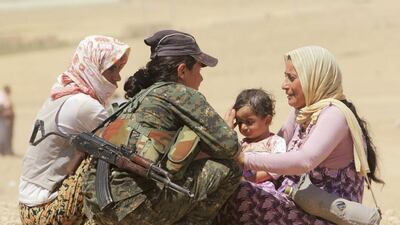New York // A UN review of international efforts to include women in peace negotiations and conflict prevention, and the protection of women in war, has taken on increased urgency because of conflicts in Iraq and Syria.
“With what is happening in the Middle East, [the study] is especially relevant,” said Radhika Coomaraswamy, the leader of the study, at its launch hosted by the UAE and Ireland missions.
The UN Security Council ordered a “high-level review” be carried out next year on the 15th anniversary of the council’s Resolution 1325, which calls on the UN to increase the participation of women in its peace and security operations as well as for countries and non-state groups to “protect women and girls from gender-based violence, particularly rape … in situations of armed conflict”.
The resolution was passed in a “never-again moment” after the Balkan wars and Rwandan genocide, where rape was widely used as a tactic by combatants, said Ms Coomaraswamy, a former UN expert on violence against women.
That never-again moment has, perhaps inevitably, reoccurred.
Over the next year, Ms Coomaraswamy will visit conflict zones to “take stock of progress, review trends over time, fill knowledge and data gaps, critically examine persistent and emerging challenges and capture lessons learnt and good practices across regions”, according to a statement by UN Women, the UN entity working on gender equality.
The study, which was ordered last year, will focus on implementation rather than solely the legal frameworks that have been put in place, Ms Coomaraswamy said.
The UAE mission, which is helping fund the study, will also launch a parallel series of expert panels that will look into the role of women in countering violent religious extremism.
The conclusions of the panel series will turned into reports by the Georgetown Institute for Women, Peace and Security that will contribute to the global study of resolution 1325.
“The role of women in the mitigation, prevention, and resolution of conflict IS central to our national priorities and to those of our region,” said Lana Nusseibeh, the UAE’s ambassador to the UN.
“The role of women in combating violent extremism and the practical means to integrate them at an early stage is essential.”
Evidence shows that when women are involved in peace negotiations, the final agreements are more likely to endure, said Ms Nusseibeh, and the UAE’s hope is that the global study will bolster “widespread support for structural changes in our approach to conflict prevention”.
The launch event at the UN was attended by representatives from dozens of countries who pledged their support, both logistical and financial, to the study. Some were acutely concerned about the rise of ISIL extremists who have attracted thousands of young Europeans to fight with the group, including many women.
The Belgian ambassador said that 70 young women from her country had travelled to Syria to join the group and that the study should look at the phenomenon.
A representative of the Norwegian mission pledged to contribute US$350,000 (Dh1.3 million) to the study, a figure Qatar’s ambassador said her country would pledge $700,000 double.
The joint Ireland-UAE hosting of the event comes after recent visits by Sheikh Abdullah bin Zayed, the UAE Minister of Foreign Affairs, to Ireland and the Irish prime minister, Enda Kenny, to the UAE. “This noteworthy initiative highlights the common commitment of the UAE and Ireland to promoting the role of women in advancing peace and security in our world,” Ireland’s ambassador to the UAE, Patrick Hennessy, said.
tkhan@thenational.ae

